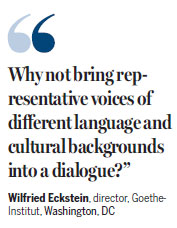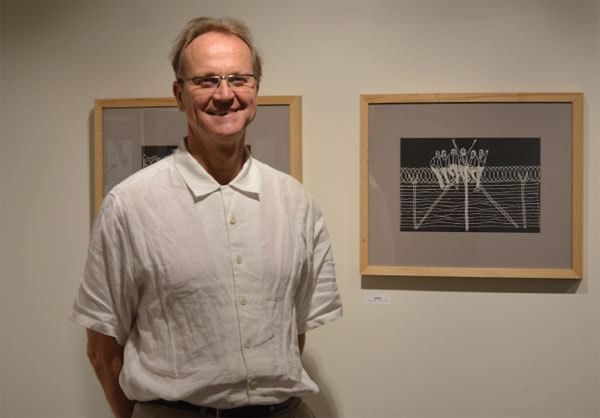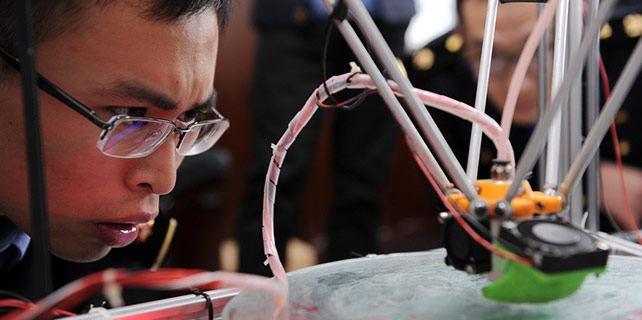Creating new kinds of dialogue
|
Wilfried Eckstein, director of the Goethe-Institut in Washington, DC. His background in foreign service dates back nearly 30 years, including three years as director of Goethe-Institut in Shanghai. Allan Fong / For China Daily |
Wilfried Eckstein, director of the Goethe-Institut in Washington, has spent his career traversing the globe, broadening his perspectives and opening his eyes to our increasingly connected global society.
His passion in life is to be a part of the exchange, creating cultural dialogues and exploring people's differing values and opinions on hot-button issues.
"It's about getting different perspectives into a dialogue - that's the main idea," said Eckstein. The Goethe-Institut is a German organization that promotes and fosters international cultural cooperation.
Eckstein has been posted in DC for five years as the director of the institute's Washington branch, but it has been just one stop in his travels. From 2009 to 2011, he was director of the Goethe-Institut in Shanghai.

"I was tasked with sustainability issues, and I felt very welcomed there," said Eckstein. "I liked the Chinese people's attitude toward intellectual interest, which is so common in big cities like Shanghai. We had very good cooperation with our project there."
Eckstein's first post with the Goethe-Institut was in Moscow from 1991 to 1996. He then moved to the Goethe-Institut in St Petersburg where he served as director from 1999 to 2003, before crossing the border to China.
Eckstein says that during his Shanghai residence, he found China to be a country open to debate and intellectual competition. "It was a very stimulating and eager situation moving forward in the country. It was a good experience."
He recalled a 2011 project in which he looked at the sustainability of an old Wuhan steel factory. "Chinese citizens were interested to see how German engineers and German architects approach a certain task," Eckstein said. "Everybody thinks China is so big, but everybody can have a share in it, and can contribute to its ideas."
Since being moved from Shanghai to Washington, Eckstein has not been back to China. But he remains tied to the country through recent and upcoming projects, working hand-in-hand with the DC Confucius Institute on various cultural exchange projects.
One of the largest projects is commissioning 18 playwrights from China, the US and Europe to each write a play on the theme of privacy in the digital age.
"The idea is to give a variety of approaches to what privacy means to people in different languages and different cultures," said Eckstein. "With culture, it's always subjective. So we thought why not bring representative voices of different language and cultural backgrounds into a dialogue?"
Eckstein believes that with the popularity of smart phones in the digital age, the issue of privacy and its meaning across cultures is a topic that bears further discussion, given people's cultural preconceptions of what privacy is.
"There are a lot of things changing in China, and there are interesting ideas about China regarding people's conception of Chinese citizens' privacy," said Eckstein.
Eckstein believes that the political dimensions of the plays' themes will create a form of dialogue between countries that has never happened before.
"The usual reaction that I get is that 'China is a collectivist culture, so why should they have an interesting notion about privacy?' And that's a valid point, but there is a privacy discussion in China," said Eckstein. "There are books published on privacy and privacy laws in China. So it will be interesting to bring that point into focus."
According to Eckstein, cultural dialogue is becoming more important as countries become more interwoven and interdependent on one another politically and economically.
"Each culture has its own history, language and values, so it is always worth having a dialogue with neighbors. Today, we are all neighbors. We do trade with each other, so if we take the notion of a global village seriously, we have to talk to everybody," said Eckstein.
Though Eckstein claims that his language skills were not proficient enough to converse with his Chinese neighbors, he certainly has found a way to create dialogue in other ways.
"We don't just show an exhibition like this for artistic value, that's not what we do. We are not just interested in this project as a work of art. We are interested in the role of art to reflect something of public relevance," said Eckstein.

















